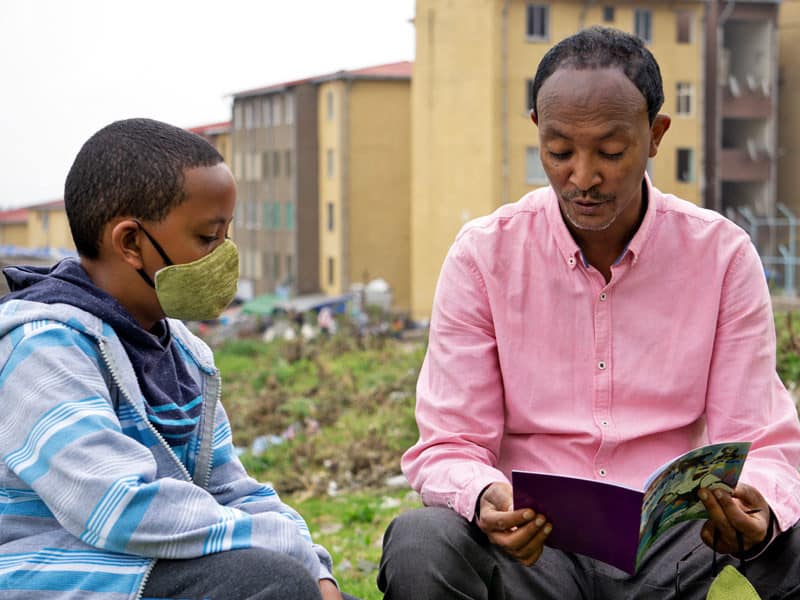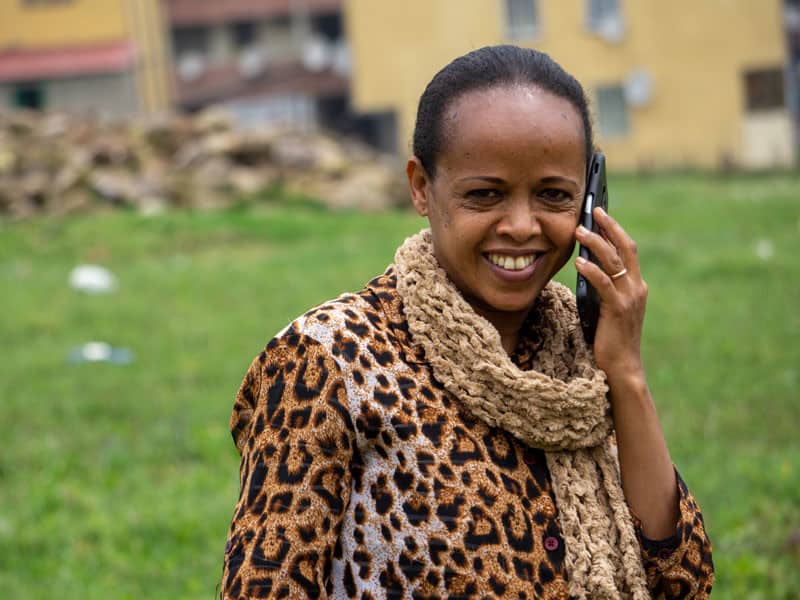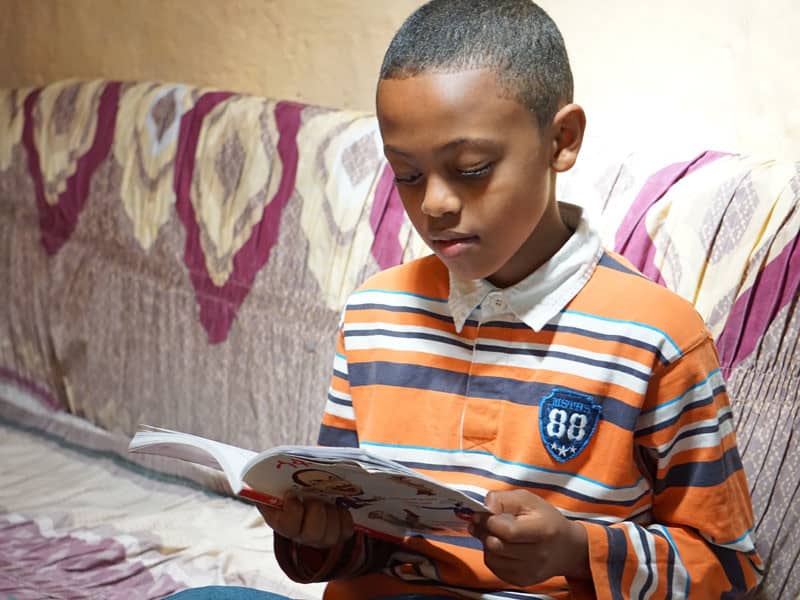On phone, TV and radio, Ethiopian families find support for remote learning
By Berihun AliJanuary 4, 2021
ADDIS ABABA – When the local reading camp was forced to close because of COVID-19, Yared Nigussie worried about his 10-year-old son Kidus.
Kidus regularly visited the reading camp near his home in Addis Ababa, one of nearly 6,000 established by the USAID READ II program, where he had hands-on practice with supplementary reading materials and support from volunteers called community literacy leaders who helped him build his reading skills. Yared says his son would often borrow books from camp to read at home.
“While he was attending the reading camps before the outbreak of the pandemic, my son’s reading was improving very much, and I was very happy about the support he got from the volunteers,” says Yared. “But, after the closure of the reading camps following the pandemic, I was really worried. I didn’t know what to do to help my son continue his reading.”

To help parents like Yared navigate the closure of classrooms and camps during the pandemic, USAID READ II developed a mobile hotline through which callers can receive guidance and tips on how to keep their children learning at home.
In partnership with mobile communications company VIAMO, the program developed content and messages for the Interactive Voice Response system, first in Amharic followed by six other mother-tongue languages. Using voice guidance and a push button menu, parents can navigate through several topics, including children’s language and literacy development, reading for children, reading with children, everyday activities for reading readiness, and gender equality and equity.
“Parents will get basic skills and knowledge on how to help their children learn to read,” Chief of Party Tassew Zewdie, Ph.D., says of the platform. “There are scientific steps and activities parents can do with their children while they are helping them to read.”
USAID READ II spread the word about the mobile hotline service through posters in public spaces and monthly phone calls and texts to nearly 60,000 parents.
Before the hotline was available, Yared recalls, “I was just trying to help but with no knowledge how to do so.”
Yared was facing a challenge common among parents: A READ II survey found that 20 percent of parents cite a lack of experience with home-based learning as a challenge. Now, more than 26,000 parents have called into the hotline for support; the hotline is expected to reach more than 200,000 before schools reopen.
“The information I get from the hotline is new to me and helps to easily support my children,” he says. “The mobile hotline provides clear and detailed information and procedures on what parents can do to help their children learn and improve their reading.”

Even through the reading camps are closed, the community literacy leaders who run the camps are still serving as another resource for parents in their communities. They too are receiving guidance from the mobile hotline to keep their own skills sharp.
“You could forget a lot of things when you don’t practice them day by day,” says community literacy leader Birhane Andarge. “After the closure of the reading camps for more than six months now, I was losing some of the skills and procedures in facilitating children’s reading.”
Volunteers like Birhane who call into the hotline will hear guidance and reminders aimed at preserving and building upon their educational expertise. Topics include tips for leading successful story time and activity time at the reading camps, fluency, vocabulary and reading comprehension.
“The hotline messages are designed to build the capacity of volunteer community literacy leaders to effectively facilitate reading camp sessions in a fun yet educational way when camps reopen,” Zewdie says. “They also provide information on how community literacy leaders can provide remote support to parents to enhance the home literacy environment.”
Reaching students through TV and radio
The development of the mobile hotline is one piece of a larger effort to use technology and media to reach students temporarily out of school, keep them engaged in education and strengthen their at-home learning environment. While parents and community literacy leaders turn to the hotline for support, students across Ethiopia are turning on their radios and televisions.
USAID READ II worked with Regional Education Bureaus to adapt literacy lessons from primary school curriculum into radio scripts, which were recorded and broadcasted on regional government radio channels. A total of 390 lessons were broadcast in Amharic, Af Somali, Tigrigna, and Afaan Oromo languages.

In addition, the program partnered with Whiz Kids Workshop to adapt its 32 existing episodes of the popular and long-running “Tsehai Loves Learning” educational TV show into six mother tongue languages, adapt eight additional lessons and broadcast them across seven regions. The lessons were then converted into radio format as well.
For students like Abenezer, 11, the program helped give back some of the educational routine and structure he was missing with schools closed.
“Every Saturday I get ready early in the morning for the ‘Tsehai Loves Learning’ TV program,” Abenezer says. “I usually take notes from the program and practice them the rest of the week.”
In addition to lessons on reading and writing, “Tsehai Loves Learning” incorporates information on how children can help protect themselves and their families from COVID-19.
“Children follow the programs and stay engaged while practicing similar exercises like sounds and shapes of letters, word construction, meaning, similar and opposite words, etc.,” Zewdie says. “The show also provides children with pieces of advice on different issues, including the coronavirus, and they are encouraged to discuss what they learned with their siblings and parents after the show.”
Until Abenezer is back in school, “Tsehai Loves Learning” has been a fun resource that’s keeping him thinking and engaged in his own education.
“The TV program has been really helpful to me to continue focusing on my education,” Abenezer says. “And now I have heard that schools are going to open soon, and I can’t wait!”
Click here for a 360-degree tour of reading camps (video produced prior to the pandemic).
With editing by Evelyn Rupert.

